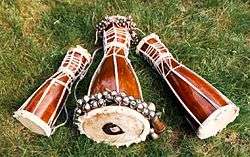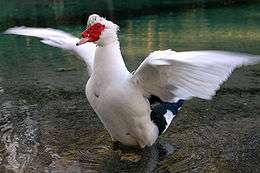bata
English
Noun

Bata drums (from left: Okónkolo, Iyá, Itótele)
bata (plural bata)
- Ethnic ceremonial double-headed drums played in triplet in the religion of Santeria, especially in Cuba and Puerto Rico, originally from the Yoruba of Nigeria.
- 1990 October 28, Paul Simon, “The Coast”, The Rhythm of the Saints, Warner Bros.
- Two guitars, bata, bass drum and tambourine
- 1990 October 28, Paul Simon, “The Coast”, The Rhythm of the Saints, Warner Bros.
Cebuano
Noun
bata
Verb
bata
Crimean Tatar
Declension
Declension of bata
| nominative | bata |
|---|---|
| genitive | batanıñ |
| dative | batağa |
| accusative | batanı |
| locative | batada |
| ablative | batadan |
Hiligaynon
Irish
Etymology
Borrowed from Middle English batte (“bat”), from Old French batte (“pestle”), from the verb batre (“to beat”), from Latin battuō, perhaps of Celtic origin.
Pronunciation
- IPA(key): /ˈbˠat̪ˠə/
Noun
bata m (genitive singular bata, nominative plural bataí)
Declension
Declension of bata
Fourth declension
|
Bare forms
|
Forms with the definite article
|
Derived terms
- bata cogaidh (“knapweed”)
- bata druma (“drumstick”)
Mutation
| Irish mutation | ||
|---|---|---|
| Radical | Lenition | Eclipsis |
| bata | bhata | mbata |
| Note: Some of these forms may be hypothetical. Not every possible mutated form of every word actually occurs. | ||
Further reading
- “bata” in Dictionary of the Irish Language, Royal Irish Academy, 1913–76.
- "bata" in Foclóir Gaeilge-Béarla, An Gúm, 1977, by Niall Ó Dónaill.
- Entries containing “bata” in English-Irish Dictionary, An Gúm, 1959, by Tomás de Bhaldraithe.
- Entries containing “bata” in New English-Irish Dictionary by Foras na Gaeilge.
Jamamadí
Etymology 1
Etymology 2
Kabuverdianu
Etymology
From Portuguese bata.
References
- Gonçalves, Manuel (2015) Capeverdean Creole-English dictionary, →ISBN
Portuguese
Scottish Gaelic
Pronunciation
- IPA(key): [pahtə]
Spanish
Related terms
Swahili

bata
Tagalog
Etymology 1
- From Proto-Malayo-Polynesian *bataq, from Proto-Austronesian *bataq.
Pronunciation
- IPA(key): /ˈba.taʔ/
See also
- batang babae
- batang lalaki
- kabata
- kababata
- isip-bata
- bata-pa
- pambata
Etymology 2
Pronunciation
- IPA(key): /ˈba.ta/
Etymology 3
Pronunciation
- IPA(key): /bɐˈta/
Tok Pisin
Synonyms
See also
This article is issued from
Wiktionary.
The text is licensed under Creative
Commons - Attribution - Sharealike.
Additional terms may apply for the media files.